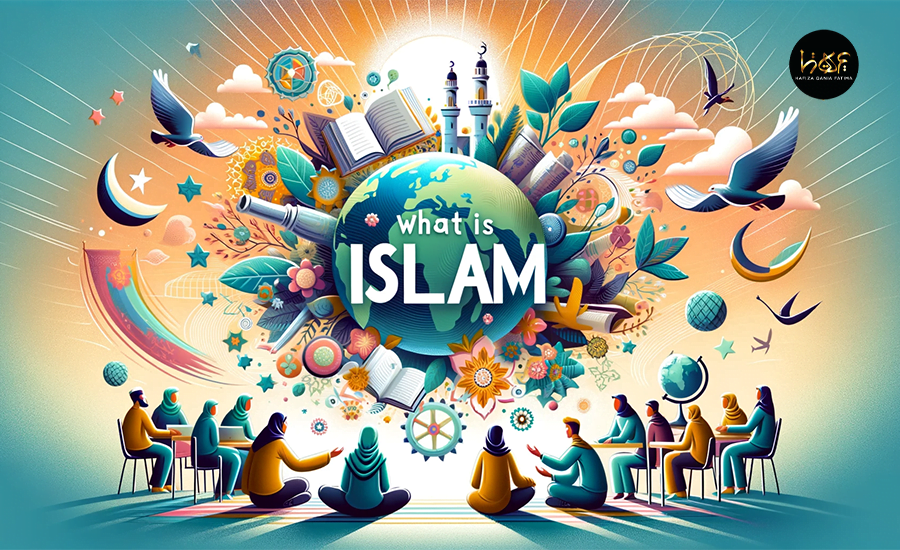
Islam, derived from the Arabic root “Salam,” meaning peace and submission, invites us into a realm of spirituality and guidance. This faith, revealed to Prophet Muhammad (صَلَّی اللہُ تَعَالٰی عَلَیْہِ وَاٰلِہٖ وَسَلَّمَ) by Allah (عَزَّوَجَلَّ), offers not just rituals but a complete life ideology, shaping every aspect of human existence. The Islamic creed or ‘Aqeedah’ is the cornerstone of this faith, providing answers to existential questions and guiding believers in their life journey.
The Islamic Creed: Foundation of Belief
Central to Islam is the belief in the Oneness of Allah (عَزَّوَجَلَّ), who is absolute, limitless, and the eternal Creator. The creed holds that Prophet Muhammad (صَلَّی اللہُ تَعَالٰی عَلَیْہِ وَاٰلِہٖ وَسَلَّمَ) is the final messenger, and the Quran is the ultimate divine revelation. Islam also encompasses belief in the Day of Judgment, heaven (Jannah), hell (Dozakh), and the existence of angels like Jibril (عَلَیْہِ السَّلَام), messengers of Allah’s words.
The Five Pillars: Islam’s Practical Framework
The five pillars—Shahada, Salah, Zakat, Sawm, and Hajj—form Islam’s backbone, guiding Muslims in their relationship with Allah (عَزَّوَجَلَّ) and the community. These pillars, far beyond mere rituals, are essential for a fulfilling Islamic life.
Shariah: The Divine Law
Shariah, the divine law in Islam, is a comprehensive set of guidelines for all aspects of life, from worship to social conduct. Based on the Quran and Sunnah, it aims to balance ethical living with spiritual growth.
Respect for Prophets: Islam’s Inclusive Belief
Islam honors all prophets, including Isa (عَلَیْہِ السَّلَام) and his mother Maryam (رَضِیَ اللہُ تَعَالٰی عَنْہ). Contrary to misconceptions, Muslims revere Isa as a prophet, not as divine, underscoring Islam’s respect for previous messengers.
Islam’s Sacred Sites: Mecca, Medina, Jerusalem
Islam’s holiness is reflected in Mecca, Medina, and Jerusalem. Mecca, with the Kaaba, is Islam’s heart, while Medina, hosting the Prophet’s grave, and Jerusalem, with Masjid Aqsa, hold profound significance.
Islamic Festivals: Celebrating Faith and Community
Muslims celebrate various festivals like Eid-ul-Fitr, Eid-ul-Adha, and the holy month of Ramadan. These occasions embody communal spirit, remembrance, and generosity, pivotal to Islamic teachings.
Nights of Significance in Islam
The Night of Ascension (Shab-e-Meraj), Night of Power (Laila-tul-Qadr), and Night of Salvation (Shab-e-Bara’at) are significant, spent in prayers, reflecting on Allah’s mercy and forgiveness.
The Concept of Hijab: Beyond Physical Covering
Hijab in Islam symbolizes modesty, encompassing behavior and conduct for both men and women. It’s not just a physical veil but a representation of ethical living and respect.
Rites and Rituals: Marking Life’s Milestones
Islam enriches life’s journey with rituals like circumcision, Aqiqa, Nikah, and Walima, celebrating life’s stages from birth to marriage, aligning these celebrations with Islamic ethics.
Understanding Polygamy in Islam
Polygamy in Islam is permitted under strict conditions of fairness. Limited to four wives, it’s a practice rooted in responsibility and justice, diverging from pre-Islamic traditions of unlimited marital bonds.
Conclusion
Islam offers a path filled with peace, submission, and comprehensive guidance. Through its teachings, rituals, and legal frameworks, Islam builds a community grounded in morality, respect, and devotion to Allah (عَزَّوَجَلَّ). This exploration invites further inquiry into the depths of Islamic teachings, encouraging believers and non-believers alike to understand this rich and diverse faith.
FAQs:
Q: What defines the Islamic creed?
A: The Islamic creed centers on belief in Allah’s oneness, Prophet Muhammad’s finality, and the Quran’s divinity.
Q: How do the Five Pillars shape a Muslim’s life?
A: They guide Muslims in their spiritual and communal duties, forming the foundation of Islamic practice.
Q: What is Shariah in Islam?
A: Shariah is the comprehensive divine law guiding all aspects of a Muslim’s life.
Q: How does Islam view other prophets?
A: Islam respects all prophets, including Isa (عَلَیْہِ السَّلَام), acknowledging their roles in humanity’s spiritual history.
Q: What is the significance of Islamic festivals?
A: Islamic festivals foster community spirit, remembrance of God, and the spirit of giving.